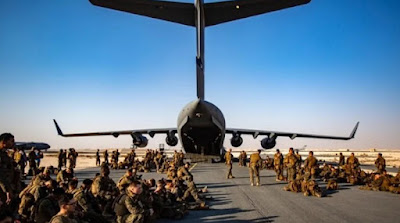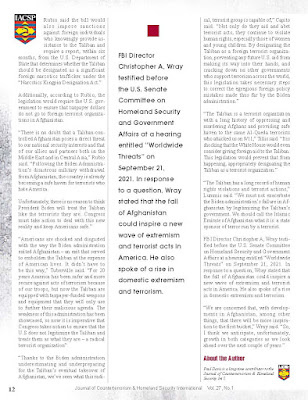Counterterrorism magazine published my piece on the aftermath of the hasty withdrawal from Afghanistan.
You can read the piece via the above and below pages or the below text:
The
Afghanistan Aftermath: Will The U.S. Withdrawal Embolden Terrorists To Attack
America?
By Paul Davis
A
retired intelligence officer who served in Afghanistan on multiple tours
expressed his bitterness over the hasty withdrawal from Afghanistan and the
surrender to the Taliban.
“We went into Afghanistan after 9/11
to root out and kill the al Qaeda terrorists who planned and executed the worst
attack on America, and to overthrow the Taliban government who aided, abetted
and offered sanctuary to al Qaeda,” recalled the former intelligence officer.
“Now twenty years later, we withdrew foolishly from Afghanistan and allowed the
Taliban back in.”
The former intelligence officer, who
preferred not to use his name, said that the hasty withdrawal and surrender to
the Taliban and their terrorist allies offers encouragement to terrorists
around the world to begin anew their terrorism campaigns. He also said that the
Taliban and their allies were major narcotics traffickers, and they used the
drug profits to finance international terrorism. He fully expects the Afghan
drug trafficking to expand now that the Taliban is back in charge of the
country.
The Afghanistan veteran was not only
critical of President Biden, he was also critical of former President Trump,
whose withdrawal agreement excluded the Afghan government, freed thousands of
Taliban fighters from prison, and set a date of May 1, 2021 for final
withdrawal. The veteran intelligence officer said that we should not have
informed the enemy of the date that we planned to leave.
“We should have left a small U.S.
military force of advisors, intelligence officers and special operators in
Afghanistan to maintain an American presence that would have ensured security
for Afghanistan and the region. After all, we still have U.S. troops stationed
in South Korea after the Korean War, and we still have U.S. troops in Japan and
Germany long after WWII.
Many foreign policy experts are
warning that Israel, the U.S. and other nations will come under more terrorism
threats as the Taliban in Afghanistan will allow terrorist groups to plan
attacks against them, as they have done when they ruled Afghanistan 20 years
ago.
Speaking to Fox News, former Deputy
Assistant Secretary of Defense for East Asia Heino Klinck stated, “The United
States’ humiliating withdrawal will inspire terrorist groups and adversaries
who now view the U.S. and its allies, including Israel, as weak. When American
power, credibility and reliability are perceived to be diminished or weakened,
the threat to all of our friends, allies and partners increases.
“And that is certainly the case in
respect to Israel as well because what appears to be a defeat of the United
States in Afghanistan and one that is being portrayed internationally as, in
essence, a truly humiliating withdrawal, is only going to serve to embolden as
well as inspire the enemies of Israel that are U.S. enemies as well,” Klinck
said.
Bing West, a Marine veteran of
Vietnam, former assistant secretary of defense, and author, noted that with
only a force of 2,500, General Scott Miller held the line against the Taliban.
The small force of U.S. troops also motivated the Afghan soldiers.
“When the Taliban massed to hit the
defenses of a city, the askaris defended their positions and U.S. air pounced
on targets,” West wrote in National Review. “In addition, our presence provided
a massive spy network and electronic listening post in Central Asia, able to
monitor Russia, China, Pakistan and Iran. At a cost of no Americans lives and
five percent of the defense budget, Afghanistan had reached a stalemate
sustainable indefinitely.”
In reaction to the Afghanistan withdrawal,
U.S. Senator Marco Rubio (R-FL), along with U.S. Senators Tommy Tuberville
(R-AL), Shelley Moore Capito (R-WV), Dan Sullivan (R-AK), Thom Tillis (R-NC),
and Cynthia Lummis (R-WY) introduced the “Preventing Recognition of Terrorist
States Act” on September 15, 2021.
The bill would direct the U.S.
Secretary of State to designate the “illegitimate” Islamic Emirate of
Afghanistan as a state sponsor of terrorism and the Taliban as a terrorist
organization.
Rubio said the bill would also impose sanctions against foreign individuals who
knowingly provide assistance to the Taliban and require a report, within six
months, from the U.S. Department of State that determines whether the Taliban
should be designated as a significant foreign narcotics trafficker under the
“Narcotics Kingpin Designation Act.”
Additionally, according to Rubio, the
legislation would require the U.S. government to ensure that taxpayer dollars
do not go to foreign terrorist organizations in Afghanistan.
“There is no doubt that a
Taliban-controlled Afghanistan poses a direct threat to our national security
interests and that of our allies and partners both in the Middle East and in
Central Asia,” Rubio said. “Following the Biden Administration’s disastrous
military withdrawal from Afghanistan, the country is already becoming a safe
haven for terrorists who hate America.
Unfortunately, there is no reason to
think President Biden will treat the Taliban like the terrorists they are.
Congress must take action to deal with this new reality and keep Americans
safe.”
“Americans are shocked and disgusted
with the way the Biden administration exited Afghanistan – an exit that served
to embolden the Taliban at the expense of American lives. It didn’t have to be
this way,” Tuberville said. “For 20 years America has been safer and more
secure against acts of terrorism because of our troops, but now the Taliban are
equipped with taxpayer-funded weapons and equipment that they will only use to
further their malicious agenda. The weakness of this administration has been
showcased, so now it is imperative that Congress takes action to ensure that
the U.S does not legitimize the Taliban and treats them as what they are – a
radical terrorist organization”.
“Thanks to the Biden administration
underestimating and underpreparing for the Taliban’s eventual takeover of
Afghanistan, we’ve seen what this radical, terrorist group is capable of,”
Capito said. “Not only do they aid and abet terrorist acts, they continue to
violate human rights, especially those of women and young children. By
designating the Taliban as a foreign terrorist organization, preventing any
future U.S. aid from making its way into their hands, and cracking down on
other governments who support terrorism across the world, this legislation
takes necessary steps to correct the egregious foreign policy mistakes made
thus far by the Biden administration.”
“The Taliban is a terrorist
organization with a long history of oppressing and murdering Afghans and
providing safe haven to the same Al-Qaeda terrorists who attacked us on 9/11,”
Tillis said. “It is shocking that the White House would even consider giving
foreign aid to the Taliban. This legislation would prevent that from happening,
appropriately designating the Taliban as a terrorist organization.”
“The Taliban has a long record of
human rights violations and terrorist actions,” Lummis said. “We must not
exacerbate the Biden administration’s failure in Afghanistan by legitimizing
the Taliban’s government. We should call the Islamic Emirate of Afghanistan
what it is: a state sponsor of terror run by a terrorist.
FBI Director Christopher A, Wray
testified before the U.S. Senate Committee on Homeland Security and Government
Affairs at a hearing entitled “Worldwide Threats” on September 21, 2021. In
response to a question, Wray stated that the fall of Afghanistan could inspire
a new wave of extremism and terrorist acts in America. He also spoke of a rise
in domestic extremism and terrorism.
“We are concerned that, with developments
in Afghanistan, among other things, that there will be more inspiration to the
first bucket,” Wray said. “So, I think we anticipate, unfortunately, growth in
both categories as we look ahead over the next couple of years.”
About the Author
Paul Davis is a long-time contributor to the Journal of Counterterrorism & Homeland Security Int’l.






No comments:
Post a Comment